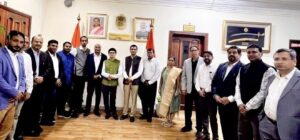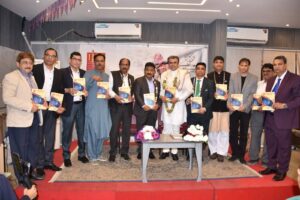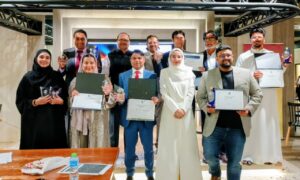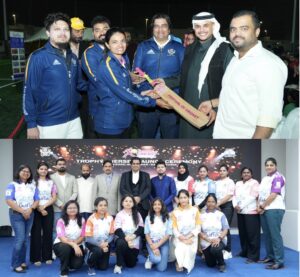
By: Syed Zia ur Rahman, YaHind.Com
Hyderabad, September 24, 2025: The second day of the three-day national workshop on “Capacity Building for Working Urdu Journalists” at Maulana Azad National Urdu University (MANUU) featured riveting technical sessions that delved into the evolving challenges and opportunities in modern journalism. Organized by the National Council for Promotion of Urdu Language (NCPUL), Ministry of Education, Government of India, in partnership with MANUU’s Department of Mass Communication and Journalism (MCJ), the event is equipping Urdu media professionals with essential skills for the digital age.
Kicking off the day’s proceedings, investigative journalist and Editor of The Times of India, Hyderabad, Mr. Sudhakar Reddy Udumula, led the first session on Fact-Checking. He unpacked the perils of misinformation, fake news, and deepfakes, while showcasing cutting-edge AI tools like Google Lens, INVID, HIVE Moderation Detector, and Wayback Machine to combat them. Prof. Mohammad Fariyad, Dean and Head of the MCJ Department, extended a warm welcome to the esteemed guest.
In the second session, Dr. Fazil Hussain Pervez, Editor-in-Chief of Urdu Weekly Gawah, Hyderabad, explored the “Prospects for Urdu Media.” He celebrated the expanding digital presence of Urdu through online mushairas and underscored the vital role of technology in elevating Urdu journalism, alongside comparative insights into education and development.
The third session, themed “Health, Education & Development Reporting in Urdu Media,” was addressed by senior journalist Mr. M.A. Majid from Hyderabad. He spotlighted critical topics, including Telangana’s Rs. 11,000 crore health budget, disease outbreaks, mental health initiatives, agricultural coverage, and access to affordable medicines.
Mr. Asad Kamal Lari, former Editor of Jansandesh Times, Varanasi, captivated the audience in the fourth session with his insights on “Ethics and Sensitivity in Reporting: Conflict, Crime & Community Issues.” He stressed the power of words in responsible journalism, advocated for conflict-sensitive approaches, and examined the influence of social media campaigns.
Wrapping up the day, Prof. Ehtesham Ahmad Khan from the MCJ Department delivered an in-depth lecture on Data Journalism. He illustrated how data visualization and storytelling techniques can render news more engaging, trustworthy, and resonant in the fast-paced digital landscape.
The sessions were skillfully moderated by MCJ research scholars: Nazakit Ali, Noushad, Nusrat Parveen, Shahwaz Khan, and Shahid Paul.
Day 2’s blend of ethical deliberations, technological advancements, and specialized reporting themes provided attendees with actionable strategies to invigorate Urdu journalism amid today’s dynamic media environment. The workshop continues on its third and final day, promising more enriching discussions.
YaHind.Com salutes the organizers and participants for their commitment to advancing Urdu media excellence.



